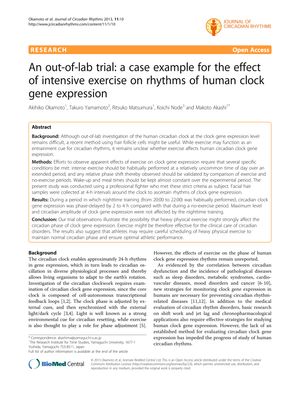An Out-Of-Lab Trial: A Case Example For The Effect Of Intensive Exercise On Rhythms Of Human Clock Gene Expression
September 2013
in “
Journal of circadian rhythms
”

TLDR Intense exercise at night can delay the body's internal clock gene expression by 2 to 4 hours.
In the 2013 study by Okamoto et al., researchers observed the effects of intensive exercise on the circadian clock gene expression in a single male professional fighter. The subject underwent intense nighttime training from 20:00 to 22:00, while keeping wake-up and meal times consistent. Hair follicle cells were collected every four hours to measure gene expression. The study found that the subject's circadian clock gene expression was delayed by 2 to 4 hours during the nighttime training compared to a no-exercise period, although the maximum level and amplitude of gene expression remained unchanged. The study suggests that intense physical exercise can significantly shift the circadian phase of clock gene expression, which has implications for athletes' training schedules and the management of circadian disorders.





